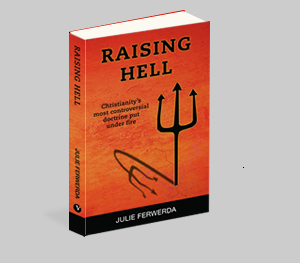“Casting down imaginations, and every high thing that exalteth itself against the knowledge of God, and bringing into captivity every thought to the obedience of Christ” 2Cor10:5 (KJV)
I’ve recently identified the driving force behind my contentious blog posts, my forum postings (usually contesting posts by religious hard-liners) and my attitudes in general towards things spiritual.
It’s simply this: I feel passionately that the God that I love has been grossly misrepresented by certain current Church doctrines and attitudes. It is apparent to me that the Gospel of a God Who loves everyone, and saves people entirely by Grace, has been watered-down by several seriously-flawed, man-made ideas.
Jesus said, “But in vain they do worship me, teaching for doctrines the commandments of men” (Mat 15:9 (KJV)) – in other words, things from men’s imaginations being taught as if they are truths worth stating as part of your belief structure (which is basically what a doctrine is).
Now, St. Paul wrote of ‘the weapons of our warfare’ being mighty in God for the destruction of [spiritual] strongholds (2Cor10:4). And the current spiritual strongholds that are in place are that God is seen as a horrible, evil, vicious, judgemental dictator; partly because of how certain people portray Him, and partly because of doctrines that have been held as true – in my opinion, erroneously – by the Church.
And it’s time to tear down these strongholds – these ‘imaginations’ – and that’s why I post as I do. These horrible man-made ideas, that malign the name of God and besmirch His Character, are indeed the ‘imaginations’ that need to be torn down, and the reason they need that is because, as the verse above says, they exalt themselves against the knowledge of God.
Let’s look at the verse again:
“Casting down imaginations, and every high thing that exalteth itself against the knowledge of God, and bringing into captivity every thought to the obedience of Christ” 2Cor10:5 (KJV)
‘Exalting’ means ‘lifting up’, so what we are saying here is that these ‘imaginations’ – doctrines made up by men – are lifted up against the knowledge of God; they give Him a bad name, if you like, and skew humanity’s perception of Him. They portray Him in ways that are simply untrue.
And so I am completely fed up with my wonderful God being portrayed as horrible, by these ‘imaginations’, and by people who really should know better.
Let me be more specific, and use a few examples.
The Doctrine of Hell
Of course, the first up is the doctrine of Hell, as espoused by most people in the current Evangelical branch of the Church. This doctrine states that if a person does not believe in Jesus in this life, then when they die they go to Hell where they will be tortured forever.
This awful doctrine speaks of a cold, heartless god who, quite arbitrarily, sends people who have never heard the gospel, to this Hell place.
To quote from Rob Bell,
“Millions have been taught that if they don’t believe, if they don’t accept in the right way, that is, the way the person telling them the Gospel does, and they were hit by a car and died later that same day, God would have no choice but to punish them forever in conscious torment in hell. God would, in essence, become a fundamentally different being to them in that moment of death, a different being to them forever. A loving heavenly Father who will go to extraordinary lengths to have a relationship with them would, in the blink of an eye, become a cruel, mean, vicious tormenter who would ensure that they had no escape from an endless future of agony. Does God become somebody totally different the moment you die?
“That kind of God is simply devastating. Psychologically crushing. We can’t bear it. No one can. And that is the secret deep in the heart of many people, especially Christians: they don’t love God. They can’t, because the God they’ve been presented with and taught about can’t be loved. That God is terrifying and traumatizing and unbearable.
“And so there are conferences about how churches can be more “relevant” and “missional” and “welcoming,” and there are vast resources, many, many books and films, for those who want to “reach out” and “connect” and “build relationships” with people who aren’t part of the church. And that can be helpful. But at the heart of it, we have to ask: Just what kind of God is behind all this?
“Because if something is wrong with your God, if your God is loving one second and cruel the next, if your God will punish people for all of eternity for sins committed in a few short years, no amount of clever marketing or compelling language or good music or great coffee will be able to disguise that one, true, glaring, untenable, unacceptable, awful reality.”
– Rob Bell, Love Wins: A Book About Heaven, Hell, and the Fate of Every Person Who Ever Lived
Everything that exists was created by God. If Hell exists, then it too must have been created by Him. But I find it hard, nay, impossible, to believe that God has indeed created Hell. It’s quite simple to tell, really: we’ve just said that by Him all things were created (Col 1:16); and without Him nothing was created that has been created (John 1:3) and, put simply, God cannot have created Hell because in Him there is no darkness. And he’d have to be a pretty dark person to have created Hell, but of course He’s not. And therefore Hell does not exist, or at least not the Hell that is portrayed in modern Christian doctrine.

(1Jn1:5)
You see, that Hell doctrine has to have increasingly complex arguments put in place to defend it, where really it (the doctrine) should not exist at all and it is simpler and far more realistic to simply discard the whole doctrine.
I too was brought up in the faith believing in the doctrine of Hell, and would you believe that I almost rejoiced in thinking that those who did not agree with me were destined to burn there. How sick was I? And yet I do think that some people believe this but without really thinking it through. They are just parroting what they have been told. There are so many other arguments I could make on this subject, but this is not the place for them. Click here for my blog’s resource page on Hell, which also includes my own personal opinions, for what they’re worth.
And, in fact, there are encouraging signs that individuals like me in the Church are ‘privately’ coming around to the point of view that God does not, and never has, condemned people to eternal suffering based on their theology. Here’s an interesting article on that subject.
‘Angry God’
The next travesty and slur on the Character of God is the Doctrine of ‘Angry God’. Now it’s not named as such in any doctrinal handbook, but it’s inferred by most Christian doctrine that god’s holiness is so pure that he can’t bear to look upon sin, and his ‘wrath’ is so great that he has to ‘punish’ people for sin. He’s a god of destruction, one that kills women and children and commands his servants to hamstring all their enemy’s donkeys. Over to Jeff Turner for a good summary of the way that God is seen by most people – and what Jesus does to banish that notion:
“The sad truth is that we have all inherited a portrait of God that looks far more like Mt. Olympus than Mt. Zion, and it’s an inheritance that most are too terrified to discard. In our Western traditions God is often presented as being cold, austere, distant and judgmental. We imagine Him surrounded by dark clouds, with a scowl sprawled across his angry mug.

“He’s very eager to be pleased, but, unfortunately, extremely difficult to please. He is a hermit that is notoriously difficult to coax out of hiding and even harder to keep around because the slightest scent of sin can send him bolting for the hills in a rage. In fact, one of our imagined deity’s greatest weaknesses is His sin allergy. Wherever there are humans behaving badly, you can be sure he’ll be absent. Where there are broken people doing broken things with their broken lives, God will not be present, for in our mythology human sin works like Kryptonite against him, forcing Him to retreat and separate Himself from us.
“He is mostly sad and mad, and rarely, perhaps when his enemies bite the dust, glad. He is heartbroken over our lack of devotion and disinterest in prayer, but is himself quite disinterested in the everyday events of our lives. He is a demented Santa Claus of sorts, who tightly clenches the naughty list – which we’ve all landed on, by the way – and dreams of filling our spiritual stockings with the burning coals of judgment. When he looks at [a nation], he doesn’t see individual people who desperately need love and mercy, but a widespread, faceless blob of darkness, deserving judgment. He’s sickened by our lack of fervency, repulsed by our spotty church attendance records, and gets all up in arms when our summer vacation extends over a Sunday morning. To put it simply, He’s angry.
mad, and rarely, perhaps when his enemies bite the dust, glad. He is heartbroken over our lack of devotion and disinterest in prayer, but is himself quite disinterested in the everyday events of our lives. He is a demented Santa Claus of sorts, who tightly clenches the naughty list – which we’ve all landed on, by the way – and dreams of filling our spiritual stockings with the burning coals of judgment. When he looks at [a nation], he doesn’t see individual people who desperately need love and mercy, but a widespread, faceless blob of darkness, deserving judgment. He’s sickened by our lack of fervency, repulsed by our spotty church attendance records, and gets all up in arms when our summer vacation extends over a Sunday morning. To put it simply, He’s angry.
“The God that a large percentage of us imagine and pay homage to is disgruntled, disappointed, and disapproving. While some may be fortunate enough to have imagined Him in His true state, my experience has been that 9 out of 10 people, myself included, do not see Him rightly. We’ve been subjected to hours of teachings that have subtly sown into our minds the idea that He is primarily a legal deity concerned with rights and wrongs, and this subconscious programming is absolutely killing us. I would even venture to say that it is the leading cause of anxiety, fear, discontentment, and depression among Christians. In all of this fear, turmoil, and mythology, however, Jesus Christ, the Word made flesh, still stands in our midst, combatting these false ideologies, and seeking to shine the light of Grace upon the face of His Daddy.”
– (From Saints in the Arms of a Happy God: Recovering the Image of God and Man, by Jeff Turner, and quoted in better context in my previous article ‘The Ultimate ‘Bad Witness’‘)
And as beautifully written by someone I know on Facebook,
“Many people live their lives in depression and anxiety from the theology through which they find their existential meaning, fearful of the future, confused about God and thus about themselves, walking around believing they are rotten to the core, and that God is disgusted with them and would wrathfully destroy them except that he sees them through the appeasing violence done to Jesus. This is a prison for the mind and heart. It is not the Abba that Jesus revealed, nor is it the revelation of the sons and daughters of God, nor is it the life abundantly Jesus came to give, nor is it the power of the kingdom of heaven that dwells within us.
“Now my goal is to help Christians deconstruct this false, baseless idea of existence, and the structures of reasoning that have imprisoned their mind, and give them permission to break free of fear and believe and trust in an extravagantly good Father, who is revealed in the Son, [Whose] love is an endless ocean that you cannot escape as long as you exist, because your existence is energized by nothing less than infinite love. There is no other reason for you to exist except for love” [emphasis mine]
Yes, be assured that Father God is good – as represented by Jesus. Anything else is a complete misconception. Want to know what Father God is like? He’s just like Jesus: “He who has seen Me has seen the Father” (John 14:9) and “The Son is the radiance of God’s glory and the exact representation of his being” – (Heb 1:3). And in Him there is no darkness – none whatsoever! Let’s read that Scripture (1Jn1:5) again:

‘God Hates Gays’
I’ve written about this many times before, but the principle of persecution of, well, not just gay/lesbian/transgender (LGBTQ) people, but other ‘minorities’ too, is just the tip of the iceberg. The Old Testament is full of lists of people who, supposedly, God will not permit in the ‘assembly’, that is, people who are not allowed to worship him. This list includes all those who are not of the tribes of Israel, and even within those tribes, there are many minorities – lepers, those who have been ’emasculated by cutting or crushing’, those with various skin conditions, women on their menstrual cycles – the list goes on. And it’s no different in today’s church – people are ostracised for all kinds of offences, the main ones of course being those that can be ‘supported’ by mistranslated and/or out-of-context Scripture verses (which basically anyone who knows their Bible can do; it’s easy to find a Scripture somewhere that will seem to support your point of view!). Oh, and those who do not toe the party line! Basically, anyone who is different, anyone who does not ‘fit in’; that person is ripe for ostracism. While this is not always a doctrine as such (although the gay persecution stuff is; there are at least six Scriptures that are misinterpreted so that gay people can be ‘scripturally’ discriminated against), it is still a major black mark against my Loving Father in the eyes of the world. What the world sees is that Christians – and therefore God – hate gays. The Church does not properly represent God on this matter! “I desire mercy, not sacrifice” – (Hosea 6:6) – God would rather people were good to each other instead of being religious! More of my musings on how the Church treats LGBTQ people can be found here, here, here, and here. But the point is that these practices are a major stumbling-block as perceived by someone considering coming to faith. And it’s a stronghold; an ‘imagination’. I understand that people are afraid of ‘differences’, but surely in the Church Family, there must be a better way than the dysfunctional practice of ostracism. Whatever happened to ‘live and let live’?
The ‘Bad Witness’
Then there’s the question of the people who profess Christianity but who come across as all harsh, judgemental**, vindictive and unbending. Like those I describe in my article – ‘Bad Witness’. These people see the Holy Spirit as a Convictor* (actually only one step from an Accuser) rather than a Comforter, and Jesus as yet another Lawgiver rather than Him being the end of the Law (Rom 10:4 (KJV)). These people can be found in their droves on religious forums. They portray Father as an angry Dictator, as we have already seen. So, all three Persons of the Godhead are maligned at the same time! And I therefore go on the forums to present the alternative view: that actually God likes the people He has created (including the harsh people!). Sometimes these people claim that I am not a Christian, and one forumite in particular was rather dischuffed that I didn’t support him at all, despite me claiming to be a believer and from that he concluded my salvation state was nil. But of course I’m not going to support him in his transmitting opinions that I feel to be toxic to others. How can I support someone I don’t agree with? But if he was ill, in need, hungry or in need of encouragement, I’d be right there beside him (except I think he lives in America so he’s too far away!)
In some ways, these people are living examples of what a person would have to become like if they are to mirror their heavenly father as they actually see him, if they believe that he’s like that too. If their god is harsh and judgemental, then they are going to portray him as harsh and judgemental. So in a way, they are just representing god in the best way they can; the problem is that, in the eyes of the world, they represent the real, loving, living God, and what the world see is, of course, awful! In a very real way, this ‘Bad Witness’ is actually an extension of the ‘Angry God’ doctrine above; what we are seeing here is merely the manifestation of that image of god to the world for them to see, and for them to be disillusioned with. Who would want to come to Church when they think it will be populated by people such as these? Naturally, these nasty types are just in the minority – most churches, including mine, are full of the sweetest, Christlike people – but can you really blame outsiders for tarring us all with the same brush?
So, that’s just four of these entrenched ideas and concepts – Imaginations – in the Church that are so destructive; there are more but these will do for now.
You see, if we really examine our doctrines on these ideas, they all, without exception, portray our loving Father God in a very bad, harsh and horrible light. Light that is as much darkness as it is light, in fact. I would even go as far as saying that this represents a Pagan, yin/yang, Karma-style (what goes round, comes round) god than a living, loving Creator.
Just because everyone believes in a particular doctrine, does not mean that that doctrine is correct. Acceptance of the majority opinion does not make a doctrine true; it is simply more likely that nobody has questioned it! Ironically, here’s a Rick Warren saying which states exactly that (the irony being that Rick is, as far as I know, one of the people who believes in Hell, and is probably against same-sex marriage 😉 )

I believe that a new revival is slowly and carefully making its way through the Church in this day. A revival where people are waking up to seeing just how fantastic God is, how loving, kind and inclusive. Jesus’s message was not just for the people of Israel in the First Century; it was for all men everywhere and in every time (John 17:20). In this time, we in the Church need to include everyone in the message of Good News which is that God loves us and sent Jesus to show us that, in all that He did and suffered, He will stop at nothing to show us this amazing Truth.
Please be assured: this isn’t supposed to be a rant in any way. I’m just explaining where I’m coming from in my writings. You know, God is so much ‘nicer’ than how many believers – even sincere ones – portray Him, or at least, who believe these untrue things about Him because they haven’t really thought them through in any great depth, and/or they have simply believed what they’ve been told without questioning it. Maybe they don’t realise how destructive these ideas are, but let me assure you that the world outside the Church sees the problems caused by these doctrines really clearly. And it’s also counter-intuitive; most people outside the Church, believe it or not, actually think that God is Good. It’s just some of the Christians who claim to represent Him that they have the problem with!
So, these are just some of the ‘Imaginations’ that need to be cast down. If you can see yourself in any of these descriptions, please ask Jesus what He thinks. And let Him change you, in His own good time! And, if you are someone who already knows that God isn’t like these imaginations, please feel free to let everyone know. Although, I appreciate that you probably already do!
Bless you!
*The Spirit does convict the world of sin, but in the sense of “He will convict the world in regard to sin … because they do not believe in Me” (Jn 16:8-9). Jesus is talking here about unbelievers, not believers. Those in Christ are no longer under condemnation nor accusation of any kind! (Rom 8:1-2)
**The concept of ‘speaking the truth in love’ (a ripped out of context verse from Eph 4:15) is abused regularly as an excuse for telling complete strangers where they are ‘sinning’, supposedly in the hope of correcting their behaviour ‘so that they won’t go to Hell’. This concept does not stand up to scrutiny on many levels: they are spoken to complete strangers so how can there be any love involved; who are we to tell others about their ‘sin’; it’s legalistic when really the governing factor should be Grace; it’s the Spirit Who convicts the world of sin (as we have seen above, in Jn 16:8-9); according to the accusing parties, those people are ‘going to Hell’ anyway, it’ll take much more than just being told that they’re doing something wrong to ‘save’ them!; as everyone knows, this ‘method’ of ‘evangelism’ simply does not work; and, finally, everyone else can see that it’s just people being judgemental and using the Scripture as an excuse. But it’s a repulsive practice, literally, in that it repels people from the beautiful Person of Jesus Who does not judge.




 mad, and rarely, perhaps when his enemies bite the dust, glad. He is heartbroken over our lack of devotion and disinterest in prayer, but is himself quite disinterested in the everyday events of our lives. He is a demented Santa Claus of sorts, who tightly clenches the naughty list – which we’ve all landed on, by the way – and dreams of filling our spiritual stockings with the burning coals of judgment. When he looks at [a nation], he doesn’t see individual people who desperately need love and mercy, but a widespread, faceless blob of darkness, deserving judgment. He’s sickened by our lack of fervency, repulsed by our spotty church attendance records, and gets all up in arms when our summer vacation extends over a Sunday morning. To put it simply, He’s angry.
mad, and rarely, perhaps when his enemies bite the dust, glad. He is heartbroken over our lack of devotion and disinterest in prayer, but is himself quite disinterested in the everyday events of our lives. He is a demented Santa Claus of sorts, who tightly clenches the naughty list – which we’ve all landed on, by the way – and dreams of filling our spiritual stockings with the burning coals of judgment. When he looks at [a nation], he doesn’t see individual people who desperately need love and mercy, but a widespread, faceless blob of darkness, deserving judgment. He’s sickened by our lack of fervency, repulsed by our spotty church attendance records, and gets all up in arms when our summer vacation extends over a Sunday morning. To put it simply, He’s angry.














